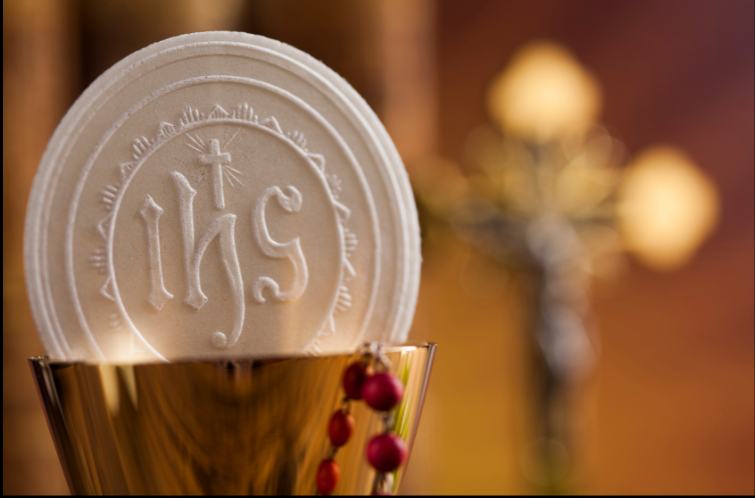 According to the Catholic Church, Jesus gives Himself to us in the Eucharist—not just spiritually but bodily and sacramentally—because He wants to be as close to us as possible, in the fullest way possible: body, blood, soul, and divinity. The Catechism of the Catholic Church (CCC) teaches:
According to the Catholic Church, Jesus gives Himself to us in the Eucharist—not just spiritually but bodily and sacramentally—because He wants to be as close to us as possible, in the fullest way possible: body, blood, soul, and divinity. The Catechism of the Catholic Church (CCC) teaches:
“In the most blessed sacrament of the Eucharist ‘the body and blood, together with the soul and divinity, of our Lord Jesus Christ and, therefore, the whole Christ is truly, really, and substantially contained’” (CCC 1374).
Here are a few key reasons why the Eucharist is more than just a spiritual reception:
1. Jesus Commanded It
At the Last Supper, Jesus didn’t say, “Remember me in your hearts.” He said:
“Take, eat; this is my body… Drink from it, all of you; for this is my blood of the new covenant…” (Matthew 26:26–28)
And He followed this by saying:
“Do this in memory of me” (Luke 22:19).
The Church has always understood this not merely as symbolic but as a real offering and command to receive Him in this way.
2. It’s an Act of Intimate Communion
God created us as both body and soul, so He communicates His grace to us in ways that are both spiritual and physical. The Eucharist is the perfect sacrament for that—just as food nourishes our body, Christ in the Eucharist nourishes our whole being.
St. Thomas Aquinas explained that the Eucharist is a “sacrament of love, a sign of unity, a bond of charity.” It is physical and spiritual union, designed for our human nature.
3. The Eucharist is a Participation in Christ’s Sacrifice
Every Mass is a re-presentation (not a repetition) of the sacrifice of the Cross. When we receive the Eucharist, we are united to that offering. This sacramental union is more than a spiritual connection—it is a communion with the living Christ who offered Himself once for all on Calvary.
4. Spiritual Communion is Real, But It’s Not the Fullness
Yes, you can receive Jesus spiritually (called Spiritual Communion), especially when you cannot attend Mass. The Church encourages this. However, spiritual communion is not a replacement but a longing for the real, sacramental reception.
Think of it like this: reading a love letter and thinking of your beloved is beautiful and meaningful—but it’s not the same as being embraced by them in person. The Eucharist is that divine embrace.
In short: Jesus gives Himself in the Eucharist because love longs to be near—fully, tangibly, personally. He meets us in the form of bread and wine so we can receive Him into our very bodies, as well as our souls.
Here are a few beautiful and powerful quotes from saints and Church Fathers that express why Jesus gives Himself to us in the Eucharist:
St. John Chrysostom (4th century Church Father):
“How many of you say: I should like to see His face, His garments, His shoes. You do see Him. You touch Him. You eat Him. He gives Himself to you, not only that you may see Him, but also to be your food and nourishment.”
St. Thomas Aquinas (13th century, Doctor of the Church):
“O precious and wonderful banquet, that brings us salvation and contains all sweetness! Could anything be of more intrinsic value? Under the old law, it was the flesh of calves and goats that was offered, but here Christ Himself, the true God, is set before us as our food.”
— Opusculum 57, “De sacramento Eucharistiae”
St. Catherine of Siena (14th century, Doctor of the Church):
“O eternal Trinity, fire and abyss of love… You gave us the Word, Your only-begotten Son, in the food of the Holy Eucharist. This is that marvelous food which You, eternal Trinity, provide for us in Your love.”
St. Francis de Sales (17th century, Doctor of the Church):
“When the bee has gathered the dew of heaven and the sweetness of the earth from the flowers, it turns it into honey; so our Lord takes our miserable works and turns them into the sweetness of His Body and Blood.”
Reflection
“You do see Him. You touch Him. You eat Him.”
The Eucharist is a staggering mystery: that the all-holy God humbles Himself not only to become man, but to become our food. In the Eucharist, we do not merely remember Christ—we encounter Him. He comes to us in silence, in hiddenness, in love, offering Himself completely. No other religion dares to proclaim such intimacy with God. In the Host, we do not just think of Jesus. We receive Jesus. We are united with Him not symbolically, but truly.
What love is this, that God would want to dwell within me—not just beside me, not just in my thoughts, but within the depths of my very body and soul?
Prayer
Lord Jesus,
You are the God who gives Yourself without measure.
In the Eucharist, You make Yourself small, hidden, and humble—
so that I may receive You, hold You, and be one with You.
Who am I, that You would choose to dwell in me?
Yet in Your mercy, You come not because I am worthy,
but because I am loved.
Let me never take this gift for granted.
Let me receive You with reverence, gratitude, and longing.
When I cannot receive You sacramentally,
let my soul still hunger for You.
And may my life become a living tabernacle of Your love.
Amen.
